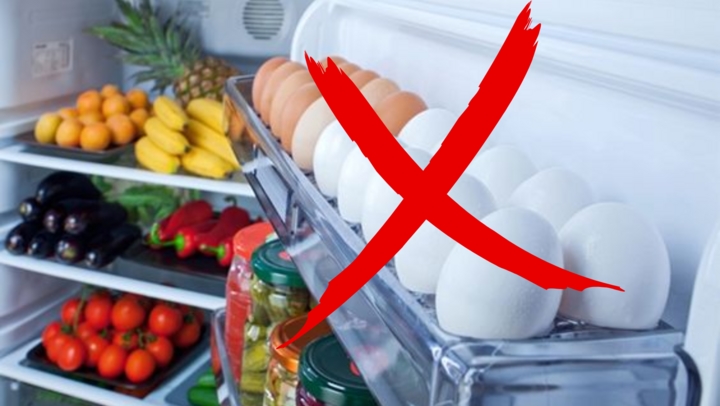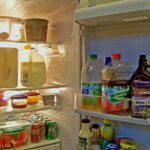If you don’t know how to store eggs properly, they will quickly spoil. In a study conducted in Britain in 1994, scientists examined the relationship between temperature and the shelf life of eggs and discovered a formula for calculating the safe consumption time of eggs.
They advise eating eggs before the yolk breaks because after that eggs will spoil very quickly. The higher the temperature, the easier the egg yolk membrane breaks.
Why shouldn’t eggs be stored in the refrigerator door?
Refrigerators commonly have compartments designed for eggs on the refrigerator door, which most people believe is the ideal place to store eggs. However, experts in food and nutrition believe that the refrigerator door is actually a poor place to store eggs, according to Daily Mail.
Expert Vlatka Lake – Business Director of Space Station, a storage company – said that the refrigerator door is the least stable area in terms of temperature, with fluctuating temperatures due to the opening and closing of the refrigerator. If stored in this position, eggs will become more easily damaged.
In addition, frequent opening and closing of the refrigerator door also exerts force on the door shelf, causing the eggs to shake, reducing their quality.
Explaining why eggs should not be stored in the refrigerator door, Dr. Tạ Tùng Duy (Vietnam Applied Medical Institute) shared on Vietnamnet that, although the refrigerator door is the position where people usually store eggs, this position often has temperature changes every time it is opened or closed, which allows bacteria to grow and weaken the protective membrane of the eggs, thereby increasing the risk of infection, causing the eggs to spoil quickly.
The best way to store eggs is to place them in dedicated trays and close them tightly to avoid absorbing the smell and taste of other foods in the refrigerator. The egg tray/box should be placed in the middle or deeper part of the refrigerator, and the temperature should always be kept stable below 20 degrees Celsius.

Why shouldn’t eggs be stored in the refrigerator door? The refrigerator door is a place with unstable temperatures that makes eggs spoil. (Image: Pinterest)
It is certain that storing eggs in the refrigerator is better than keeping them outside. According to Dr. Duy, many studies have shown that fresh eggs stored at room temperature will deteriorate in quality after a few days and should be used within 1-3 weeks.
Meanwhile, eggs stored in the refrigerator will maintain their quality and freshness longer, at least double that of eggs stored at room temperature. However, experts believe that the maximum storage time for eggs is 3-5 weeks, avoiding the use of eggs that are too old.
Proper storage and use of eggs
To better store eggs after purchasing them, expert egg assessors in the UK recommend keeping the eggs in their original carton, with the small end up and the large end down, then placing them in the middle compartment of the refrigerator.
In addition, to enhance the taste of dishes made from eggs, let the eggs return to normal temperature for about 15 minutes before cooking, and use them within 2 hours.
Storage time and how to identify if eggs are spoiled:
The maximum time for you to store eggs in the refrigerator is 3-5 weeks.
To check whether an egg is spoiled or not, prepare a glass of cold water, place the egg in the glass, and begin observing: A fresh egg will sink and lie still at the bottom of the glass. A slightly old egg (1 week) will sink to the bottom and slightly float on the water’s surface. A old egg (3 weeks) will balance with the pointed end downward and the larger end upward. A spoiled egg will float completely on the water’s surface.
According to VTC news
8 Common Mistakes People Make with Cutting Boards
Are you using your cutting board correctly? Many Vietnamese households rely on cutting boards in their kitchen, but not everyone knows how to use them properly, especially when it comes to wooden cutting boards. Check out these 8 mistakes to avoid when using a cutting board to ensure both hygiene and safety for everyone in your family.
Is Refrigerated Leftovers Linked to an Increased Risk of Cancer?
Dr. Lam Van Man, Head of Research, Development and Technology Transfer Department of the Institute of Safety Food, has warned of the risk of food poisoning when reheating leftovers from the refrigerator. But what should we be aware of when it comes to the possibility of these leftovers causing cancer? Here, we explore what the experts have to say on the matter and offer some tips for safe eating.
Preserving Leftover Food from the Tet Holiday
With the beginning of the Lunar New Year, many households are stocking up on food to celebrate the festive occasion. While keeping food in the refrigerator is convenient, it can also be harmful to users if not done correctly. We have compiled a few tips to help ensure food remains fresh and safe to consume during Tet.






































